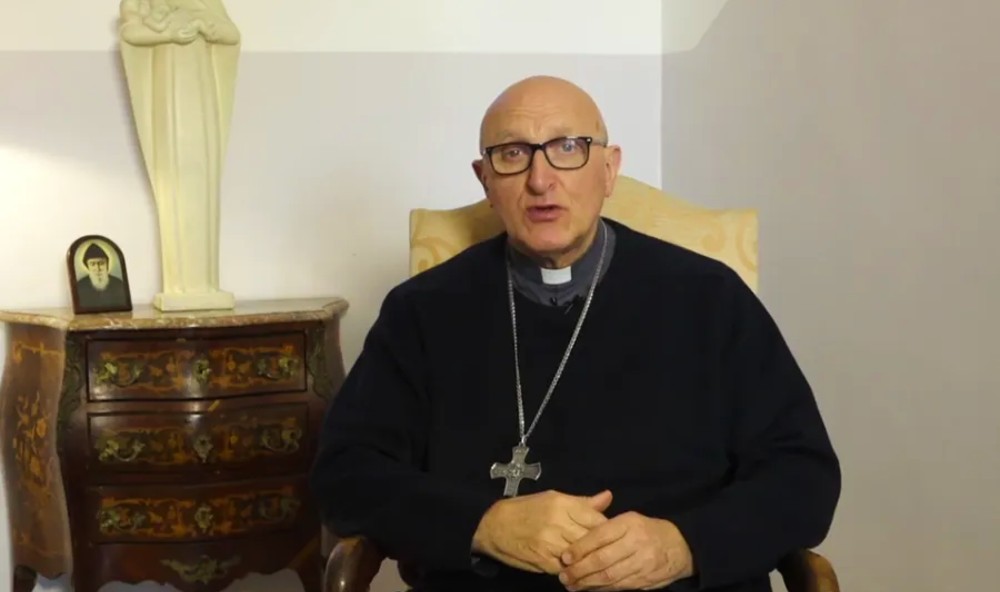 Dear readers, Catholic Online was de-platformed by Shopify for our pro-life beliefs. They shut down our Catholic Online, Catholic Online School, Prayer Candles, and Catholic Online Learning Resources—essential faith tools serving over 1.4 million students and millions of families worldwide. Our founders, now in their 70's, just gave their entire life savings to protect this mission. But fewer than 2% of readers donate. If everyone gave just $5, the cost of a coffee, we could rebuild stronger and keep Catholic education free for all. Stand with us in faith. Thank you. Help Now >
Dear readers, Catholic Online was de-platformed by Shopify for our pro-life beliefs. They shut down our Catholic Online, Catholic Online School, Prayer Candles, and Catholic Online Learning Resources—essential faith tools serving over 1.4 million students and millions of families worldwide. Our founders, now in their 70's, just gave their entire life savings to protect this mission. But fewer than 2% of readers donate. If everyone gave just $5, the cost of a coffee, we could rebuild stronger and keep Catholic education free for all. Stand with us in faith. Thank you. Help Now >
Crafters feel pinch of new children's lead-testing law
FREE Catholic Classes
Contra Costa Times (MCT) - In early January, Mimi Sweeny began rising before dawn to wage an online battle from her office against a pending federal law she says will drive her children's apparel company out of business.
Highlights
McClatchy Newspapers (www.mctdirect.com)
1/29/2009 (1 decade ago)
Published in Marriage & Family
The owner of Baby Leo, a small, home-based San Francisco business that offers colorful satin and velvet-lined capes for children, is not alone. Joining her in virtual combat during those early hours is a cadre of other small-business "crafters" making children's clothing and accessories.
These entrepreneurs, many of them mothers running businesses from spare rooms or garages, fire off dozens of e-mails daily to politicians, in an attempt to win amendments to a federal law taking effect Feb. 10 that requires testing for lead, even in such products as organic cotton and recycled felt, which they say wouldn't contain lead. The daily deluge of e-mails challenging the Consumer Product Safety Improvement Act is followed by faxes, letters and phone calls to congressional staff members.
"We've all been up at 6, sending e-mails, writing letters," Sweeny said. "We're just bombarding politicians to look at what they signed."
Last summer, Congress overwhelmingly passed the act, and former President George W. Bush signed it Aug. 14. It mandates lab testing for lead in products intended for use by children age 12 and younger, and requires each product to bear a label stating how and where it was made. The law also sets strict limits on phthalate levels, all but eliminating the chemical from children's products, where it's been used to impart flexibility and durability in plastics.
It passed after the recall of some 40 million toys in 2007 for excess lead, most of which were made in China for large toy manufacturers.
Lead is a potent neurotoxin and in animal studies phthalates harm reproductive systems. They're particularly toxic in utero and during early child development.
But opponents of the law, as it's now written, say large toy makers are the true target, not small U.S. enterprises supporting a burgeoning demand for eco-friendly, locally made children's goods. These small-business owners are calling it the "National Bankruptcy Act." The law's broad language affects virtually every industry producing or selling goods designed for children. In addition to toys, books, posters, diapers, furniture, tableware, costumes, hair accessories, and sporting goods such as bicycles are among the affected products, if they're made solely for children's use.
Sweeney said it will cost at least $800 to run lead tests on each of her 10 cape styles, and another $2,400 each to test if they're phthalate free. When she sews up subsequent batches of the same design, or creates a new style, she'll need to repeat the tests.
Janelle Jones, owner of Abe Jones in Oakland, Calif., another home-based children's clothing firm, joined Sweeney in the early morning e-mail onslaught.
But last month, Jones took a full-time job, as she feared for her livelihood with the impending law. She said she'll close Abe Jones if the law takes effect without exemptions for businesses like hers.
Plum, a clothing manufacturer in Emeryville, Calif., plans to stop importing colorful "finger puppets" knitted by Peruvian village women, along with knit caps and mittens, if the law isn't amended to exempt them from lead testing.
Small U.S. toy makers, crafting such products as wood toys, dolls and puppets, were among the first "micro-producers" to grasp the reach of the new law, and they formed the Handmade Toy Alliance to seek exemptions for their goods.
Then in November, the publishing industry learned that children's books, along with such printed products as posters, also fell under the law's purview. Millions of books from schools, bookstores and warehouses may have to be dumped, said Chip Gibson, president and publisher of Random House Children's Books, in a Jan. 9 article in "Publishers Weekly." The law also increases fines to $100,000 per violation, Gibson noted.
The Association of American Publishers petitioned the Consumer Product Safety Commission to exempt ordinary books, but in a Dec. 23 letter, the commission's general counsel declined the request. In addition to paint used to decorate books, the ink on pages might also contain lead, said Cheryl Falvey, the general counsel. However, a lawyer with the association pointed out that in 20 years, there has only been one report of excess lead linked to a book _ due to the spiral metal binding.
Word trickled next to libraries that the law applied to their holdings. In a Dec. 8 letter to Congress, the American Library Association stated that under the new law, school and museum libraries would have to restrict children's access to books.
"If Congress does not act soon, libraries will be forced to remove books from their shelves," Jim Rettig, president of the library association, said earlier this month.
A group of librarians in the San Francisco Bay area is monitoring the situation through an online listserv. The Oakland Public Library's director, Carmen Martinez, declined to comment on the situation.
Thrift store officials nationwide realized that their children's goods would also have to comply with the law. Like all retailers, the thrift stores won't be required to test for lead, the product safety commission clarified in a Jan. 8 statement. But the commission offered scant comfort by reminding the shops that they are still legally liable for ensuring products sold are in compliance.
Goodwill Industries International is seeking an exemption for nonprofit social-service providers, said Charlene Sarmiento, a Goodwill spokeswoman.
Kathleen Scrafano, a senior director with Goodwill Industries of in California's Greater East Bay area, said that without the exemption, it would have to discontinue accepting and selling children's goods, leading to more waste in landfills and decreasing sales by 9 percent, or $1.8 million annually.
As the deadline draws near, the stakes are increasing. A class-action lawsuit against the Consumer Product Safety Commission seeking a temporary restraining order against the new law's implementation is expected to be filed soon, with two children's clothing makers as lead plaintiffs.
And grass-roots campaigns like Sweeney's are having some effect. In a Jan. 21 letter to a House committee urging a hearing on the matter, Reps. Joe Barton, R-Texas, and George Radanovich, R-California, wrote that e-mails, letters and phone calls to their offices about the new law "now number in the thousands." But Joseph Martyak, chief of staff for the product safety commission's acting chairman, said he has heard from Capitol Hill that no hearing to amend the law will be held. Congress members, he said, insist that the commission has sufficient regulatory flexibility to grant valid exemptions, an assertion with which Martyak strongly disagrees.
"We're looking at all the options that we have," Martyak said. "But with our hands tied tightly, and wiggling our fingers, we just can't make this happen by Feb. 10."
___
ABOUT THE LAW
WHAT: Consumer Product Safety Improvement Act
WHEN: Law takes effect Feb 10.
WHAT IT DOES: Limits lead levels in children's products to 600 parts per million, dropping to 300 parts per million in August. It requires third-party testing to verify compliance.
PRODUCTS AFFECTED: Thousands of children's items including books, clothing, furniture and tableware, and toys.
EXEMPTIONS WANTED: A number of organizations, citing economically catastrophic effects, are pressuring for exemptions for products they say inherently wouldn't contain levels exceeding standards.
"This is a potential calamity like nothing I've ever seen. The implications are quite literally unimaginable."
_Chip Gibson, president and publisher of Random House Children's Books
"If the (law) is applied to books and paper-based materials, public, school and museum libraries will have to either remove all their books or ban all children under 12 from visiting. This cannot be what Congress intended."
_Emily Sheketoff, executive director of the American Library Association's Washington, D.C., office
"The effect on our business could be devastating, particularly in this economy, when more and more people are coming to us for help with job training and placement."
_Kathleen Scrafano, a senior director with Goodwill Industries of the Greater East Bay
___
© 2009, Contra Costa Times (Walnut Creek, Calif.).
Join the Movement
When you sign up below, you don't just join an email list - you're joining an entire movement for Free world class Catholic education.
-

-
Mysteries of the Rosary
-
St. Faustina Kowalska
-
Litany of the Blessed Virgin Mary
-
Saint of the Day for Wednesday, Oct 4th, 2023
-
Popular Saints
-
St. Francis of Assisi
-
Bible
-
Female / Women Saints
-
7 Morning Prayers you need to get your day started with God
-
Litany of the Blessed Virgin Mary
Meta's New Commitment to Free Speech and Its Potential Impact on Online Discourse
-

Pope Francis Accepts Resignation of Bishop Dominique Rey of Frejus-Toulon
-

Bound by Betrayal: Katie's Struggle with Lust, Lies, and Redemption
-
John: A Story of Addiction, Hopelessness, and the Search for Redemption
-
Science vs. Faith: The Battle for Truth and Hope
Daily Catholic
 Daily Readings for Wednesday, January 08, 2025
Daily Readings for Wednesday, January 08, 2025 St. Thorfinn: Saint of the Day for Wednesday, January 08, 2025
St. Thorfinn: Saint of the Day for Wednesday, January 08, 2025 Prayer for a Blessing on the New Year: Prayer of the Day for Tuesday, December 31, 2024
Prayer for a Blessing on the New Year: Prayer of the Day for Tuesday, December 31, 2024- Daily Readings for Tuesday, January 07, 2025
- St. Raymond of Pennafort: Saint of the Day for Tuesday, January 07, 2025
- St. Theresa of the Child Jesus: Prayer of the Day for Monday, December 30, 2024
![]()
Copyright 2024 Catholic Online. All materials contained on this site, whether written, audible or visual are the exclusive property of Catholic Online and are protected under U.S. and International copyright laws, © Copyright 2024 Catholic Online. Any unauthorized use, without prior written consent of Catholic Online is strictly forbidden and prohibited.
Catholic Online is a Project of Your Catholic Voice Foundation, a Not-for-Profit Corporation. Your Catholic Voice Foundation has been granted a recognition of tax exemption under Section 501(c)(3) of the Internal Revenue Code. Federal Tax Identification Number: 81-0596847. Your gift is tax-deductible as allowed by law.








 Daily Readings for Wednesday, January 08, 2025
Daily Readings for Wednesday, January 08, 2025 St. Thorfinn: Saint of the Day for Wednesday, January 08, 2025
St. Thorfinn: Saint of the Day for Wednesday, January 08, 2025 Prayer for a Blessing on the New Year: Prayer of the Day for Tuesday, December 31, 2024
Prayer for a Blessing on the New Year: Prayer of the Day for Tuesday, December 31, 2024

